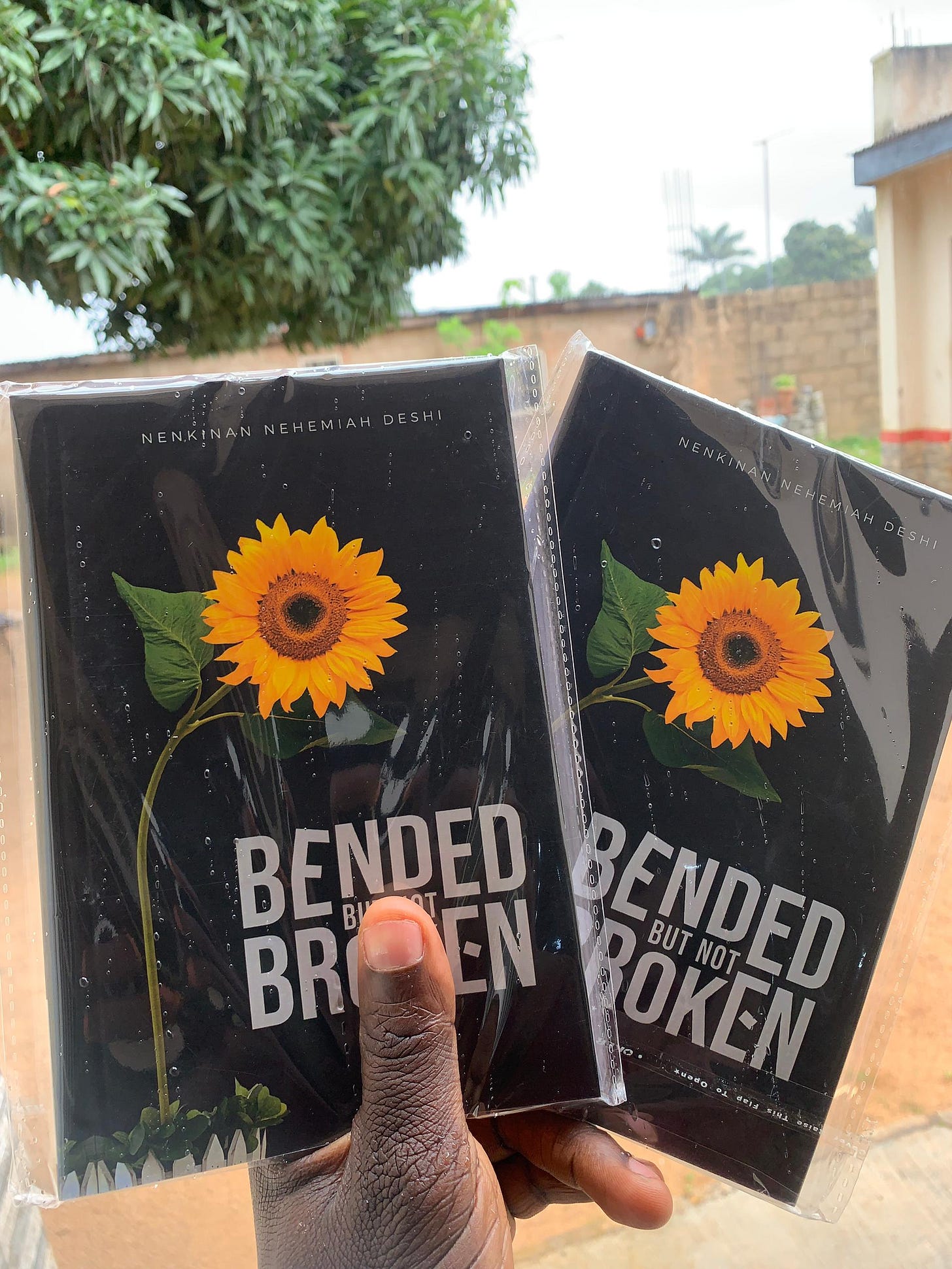Deshi, Nenkinan Nehemiah. Bended But Not Broken. Jos: Self-published. 2024.
Dear Fellow,
I never clearly understood what this song—Sweet Victory (2014) by Trip Lee, Dimitri McDowell, and Leah Smith—was about when I first listened to it, in 2016. That was about two years after a schoolmate introduced me to Christian Hip-Hop (CHH). I remember Lecrae’s All I Need Is You (2014) was the first CHH song I listened to. The book reviewed in this despatch became the preface for me to Trip Lee’s song mentioned above, and vice versa
The Backstory
Nenkinan Nehemiah Deshi reached out to me on Thursday, 5th September 2024 to say that he wants to get his book out in print—the book was out in electric format last year. When the manuscript got to me, for reasons I cannot explain, I was compelled to retype the entire manuscript. And I did retype the whole thing, word after word. Little did I know that the task was for my good. And that was how I read his book Bended But Not Broken.
The Reading
First, Nenkinan made a promise to write this book as a teenager—just around the time his battle with arthritis began. “This book was inspired by the events of my life from October 2012,” he wrote in the Introduction, “when my life, as I was getting to know it, took a crazy turn, and continues on that trajectory. In these years I’ve been bended, in pain and turmoil, in crisis, broken in many ways. I have struggled, but I am here and to God be the glory” (p. v–vi).
Then you ride into a journey through eight chapters, a chapter entitled “END NOTES”, a guide to one’s identity in Christ, and a list of references. What sets this book apart from others I have read and worked on is the content—citations of songs and movies, and a few other books.
The Lessons
“I’m wading in my weakness,” Nenkinan quoted Trip Lee, “He made me dependent” (p. 4). The author draws on this line to express a profound lesson he learned in his journey so far; that we are not made to be and do life all by ourselves; but to be dependent, first on God, then on the people He puts in our lives.
Then he opens the chapter entitled “Hope” (Chapter Eight) with this verse from Sweet Victory (2014):
“The victor ain’t the one that’s winning seventh inning;
Trophies don’t go to the ones that got a good beginning.
When I say I win I don’t mean the state I’m in;
I mean that day when the grace got face out then.
I’m winning ‘cause I reign with Him”
What poetry! And if you must make out the correct and full meaning of this excerpt, you must first understand that Trip Lee is a Christian, and "Him" in that excerpt is Jesus.
On the question of credibility and authority to write such a book rooted in theology and experience, Nenkinan shared excerpts from these classics: If I Can Help Somebody (1956) by Mahalia Jackson1 and Find Us Faithful (1988) by Steve Green.2
I now not only seek to listen closely for the message in the storylines of songs; I search for the lyrics, and that practice affords me better clarity and beauty of the songs.
The Conclusion
Even more striking is Nenkinan’s words in closing the narrative. He wrote:
“I wrote this because I believe in sharing our experiences and shining a light for those who come behind us. . . . I don’t live under any illusion that I will live to be 100. I don’t know that. What God has set in my heart is eternity and not longevity in years. What I am teaching myself to desire is to do God’s will and after that go into eternal rest. I encourage you to do the same.” (p. 77–8)
I once was asked to give a piece of advice to writers younger than me in the practice of the craft, why they should keep writing. I told them that day, and I will say it here again, in light of Nenkinan’s words, that your story could be the missing piece in the puzzle your reader is solving at the time of reading your story. Be encouraged to desire God’s will for your life, and to enter eternal rest—God’s rest. Amen.
Finally, I was quite sceptical about Trip Lee in days when I couldn’t make out the message of his songs by merely listening from the music box, and I didn’t make an effort then to get the lyrics of his songs. But Nenkinan’s book had me look up each song cited in it. And that has made a difference in my interaction with music: I now not only seek to listen closely for the message in the storylines of songs; I search for the lyrics, and that practice affords me better clarity and beauty of the songs. Stories in Songs are beautiful.
Your LetterMan,3
Tongjal, W. N.
The excerpt from If I Can Help Somebody (1956) that he shared in the book: “If I can help somebody / As I travel along. / If I can help somebody / With a word or song / If I can help somebody / From doing wrong / My living shall not be in vain.”
The excerpt from Find Us Faithful (1988) that he shared in the book:
“Oh, may all who come behind us find us faithful
After all our hopes and dream have come and gone
May the clues that they discover, and the memories they uncover,
Become the light that leads them to the road we each must find.”




“...your story could be the missing piece in the puzzle your reader is solving at the time of reading your story.” 💯✨